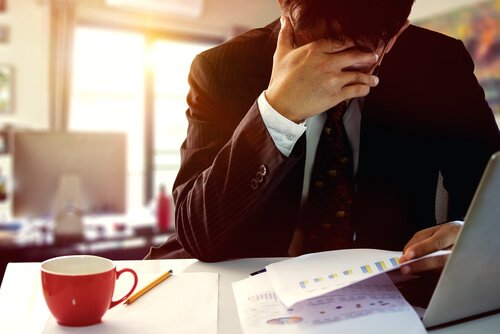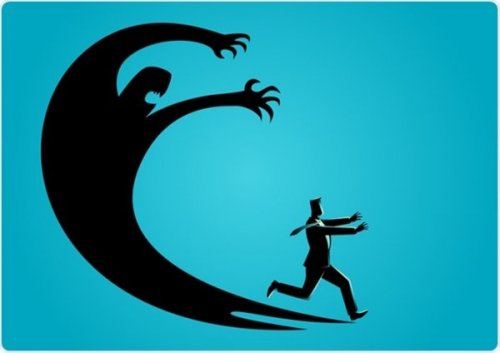Anxiety Symptoms You Should Know


Written and verified by the psychologist Valeria Sabater
Every person experiences anxiety differently. Anxiety is like a liquid that keeps its color but adapts to the shape of the recipient it’s in. In this metaphor, the color is the set of anxiety symptoms that manifest in most cases. In all cases, anxiety leads to a psychological state of accumulation. Thus, any problem seems to weigh twice as much and any setback becomes enormous.
To this day, the amount of diagnoses that fit into anxiety disorders is similar to that of depression. So much so, that the temptation to see the two phenomena as faces of the same coin is substantial. Additionally, we know that the number of diagnoses is rising every year and that anxiety affects more women than men.
Difficulties diagnosing anxiety disorders
Now, something that studies like the one that was carried out by the Royal College of Psychiatrists in the United Kingdom suggest is that it isn’t easy to make a precise diagnosis when it comes to anxiety. Various professionals from various fields (primary care physicians, psychiatrists, nurses, psychologists, physiotherapists, and more) participated in this study. They pointed out that it’s very easy to confuse anxiety symptoms with other clinical conditions.
Therefore, stomach pain isn’t always caused by poor digestion nor is back pain the result of bad posture. The truth is that anxiety disorders can cause many problems.
“The intensity of the anguish is proportional to the meaning that the situation has for the affected person, even though they aren’t aware of the reasons for their anxiety.”
-Karen Horney-

The five areas of anxiety symptoms
We can group anxiety symptoms in five areas. It’s common to experience different symptoms from each of them. For example, a person with social anxiety can suffer from classic symptoms such as tremors, tingling, and dizziness. Likewise, they can also suffer from cognitive symptoms.
Let’s take a look at the characteristics of each category.
Physical anxiety symptoms
- Tachycardia
- Shortness of breath
- Chest tightness
- Dizziness
- Sweating
- Muscle tension
- Stomachache
- Exhaustion
- Headache
Also, if these symptoms are intense and long-term, they can lead to more serious conditions. For example, insomnia, eating disorders, lack of sexual desire, weakened immune system, etc.
On the other hand, it’s very common for these anxiety symptoms to make the person think that they’re suffering some type of physical illness. Therefore, it’s very important to resort to psychologists that can help find the root cause of these symptoms.

Cognitive symptoms
Cognitive symptoms are related to the thoughts that anxiety usually generate. The most common ones are:
- Constant worrying
- Catastrophic thoughts
- Memory problems
- Giving excessive importance to unimportant facts
- Stress
- Concentration problems
- Difficulty making decisions
- Obsessive thoughts
- Feelings of emptiness
- Sensations of unfamiliarity with common surroundings
- Uncertainty
- Fear of losing control
- Suicidal thoughts
Emotional symptoms
Emotional or affective anxiety is another condition that we must take into account, especially if it’s constant.
- The most common emotional anxiety symptoms are apathy and anguish.
- Mood swings and irritability.
- Crying.
- Nervous laughter.
Behavioral symptoms
One of the most recurrent anxiety symptoms is avoidance. It’s very common for patients with this type of condition to avoid certain situations and actions. Namely, they feel that they may suffer an anxiety attack that they won’t be able to control. Their insecurity may make them believe that the ground beneath their feet is a minefield.
Therefore, it’s very common to experience the following:
- Feeling blocked or acting impulsively.
- Changes in body expression, such as excessive slowness or hyperactivity.
Social symptoms
- Difficulty having conversations or talking excessively.
- Disinterest for hobbies they were once passionate about.
- Need for solitude and isolation.
- Avoidance of common activities such as working or interacting with friends.

In conclusion, as we can see, anxiety symptoms are as varied as they are exhausting. Therefore, don’t hesitate to consult a specialized professional if you find yourself in this situation.
Many people visit their general practitioners regularly without realizing what’s really behind their insomnia, exhaustion, or persistent headaches. Thus, consulting a psychologist can improve your mental, physical, and emotional well-being.
Every person experiences anxiety differently. Anxiety is like a liquid that keeps its color but adapts to the shape of the recipient it’s in. In this metaphor, the color is the set of anxiety symptoms that manifest in most cases. In all cases, anxiety leads to a psychological state of accumulation. Thus, any problem seems to weigh twice as much and any setback becomes enormous.
To this day, the amount of diagnoses that fit into anxiety disorders is similar to that of depression. So much so, that the temptation to see the two phenomena as faces of the same coin is substantial. Additionally, we know that the number of diagnoses is rising every year and that anxiety affects more women than men.
Difficulties diagnosing anxiety disorders
Now, something that studies like the one that was carried out by the Royal College of Psychiatrists in the United Kingdom suggest is that it isn’t easy to make a precise diagnosis when it comes to anxiety. Various professionals from various fields (primary care physicians, psychiatrists, nurses, psychologists, physiotherapists, and more) participated in this study. They pointed out that it’s very easy to confuse anxiety symptoms with other clinical conditions.
Therefore, stomach pain isn’t always caused by poor digestion nor is back pain the result of bad posture. The truth is that anxiety disorders can cause many problems.
“The intensity of the anguish is proportional to the meaning that the situation has for the affected person, even though they aren’t aware of the reasons for their anxiety.”
-Karen Horney-

The five areas of anxiety symptoms
We can group anxiety symptoms in five areas. It’s common to experience different symptoms from each of them. For example, a person with social anxiety can suffer from classic symptoms such as tremors, tingling, and dizziness. Likewise, they can also suffer from cognitive symptoms.
Let’s take a look at the characteristics of each category.
Physical anxiety symptoms
- Tachycardia
- Shortness of breath
- Chest tightness
- Dizziness
- Sweating
- Muscle tension
- Stomachache
- Exhaustion
- Headache
Also, if these symptoms are intense and long-term, they can lead to more serious conditions. For example, insomnia, eating disorders, lack of sexual desire, weakened immune system, etc.
On the other hand, it’s very common for these anxiety symptoms to make the person think that they’re suffering some type of physical illness. Therefore, it’s very important to resort to psychologists that can help find the root cause of these symptoms.

Cognitive symptoms
Cognitive symptoms are related to the thoughts that anxiety usually generate. The most common ones are:
- Constant worrying
- Catastrophic thoughts
- Memory problems
- Giving excessive importance to unimportant facts
- Stress
- Concentration problems
- Difficulty making decisions
- Obsessive thoughts
- Feelings of emptiness
- Sensations of unfamiliarity with common surroundings
- Uncertainty
- Fear of losing control
- Suicidal thoughts
Emotional symptoms
Emotional or affective anxiety is another condition that we must take into account, especially if it’s constant.
- The most common emotional anxiety symptoms are apathy and anguish.
- Mood swings and irritability.
- Crying.
- Nervous laughter.
Behavioral symptoms
One of the most recurrent anxiety symptoms is avoidance. It’s very common for patients with this type of condition to avoid certain situations and actions. Namely, they feel that they may suffer an anxiety attack that they won’t be able to control. Their insecurity may make them believe that the ground beneath their feet is a minefield.
Therefore, it’s very common to experience the following:
- Feeling blocked or acting impulsively.
- Changes in body expression, such as excessive slowness or hyperactivity.
Social symptoms
- Difficulty having conversations or talking excessively.
- Disinterest for hobbies they were once passionate about.
- Need for solitude and isolation.
- Avoidance of common activities such as working or interacting with friends.

In conclusion, as we can see, anxiety symptoms are as varied as they are exhausting. Therefore, don’t hesitate to consult a specialized professional if you find yourself in this situation.
Many people visit their general practitioners regularly without realizing what’s really behind their insomnia, exhaustion, or persistent headaches. Thus, consulting a psychologist can improve your mental, physical, and emotional well-being.
All cited sources were thoroughly reviewed by our team to ensure their quality, reliability, currency, and validity. The bibliography of this article was considered reliable and of academic or scientific accuracy.
- Ellis, Albert (2013) Cómo controlar la ansiedad antes de que le controle a usted. Ediciones Paidós
- Mulholland, C. (2017). Anxiety disorders. In Psychiatry by Ten Teachers, Second Edition (pp. 78–91). CRC Press. https://doi.org/10.1201/9781315380612
This text is provided for informational purposes only and does not replace consultation with a professional. If in doubt, consult your specialist.







